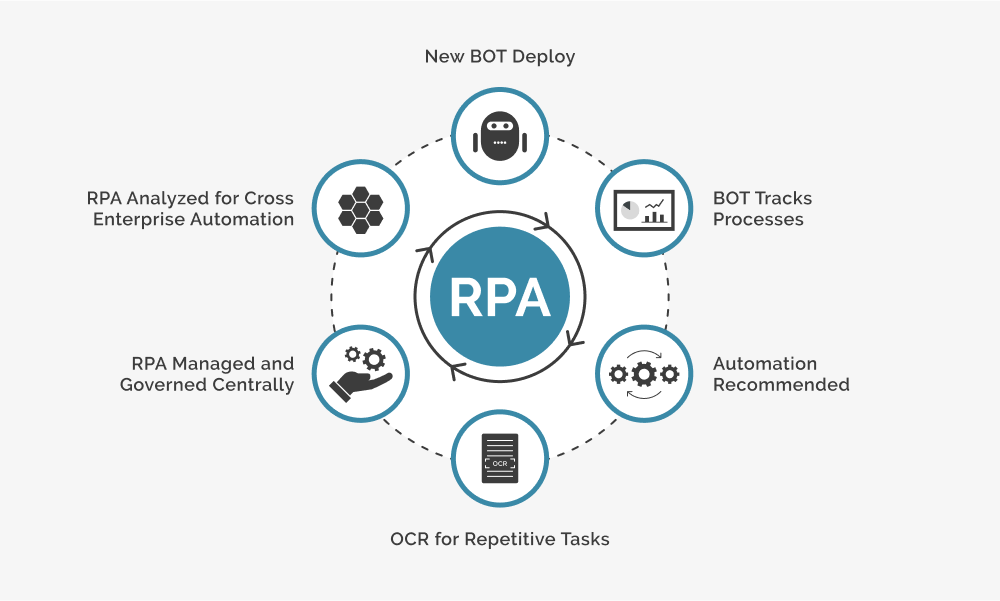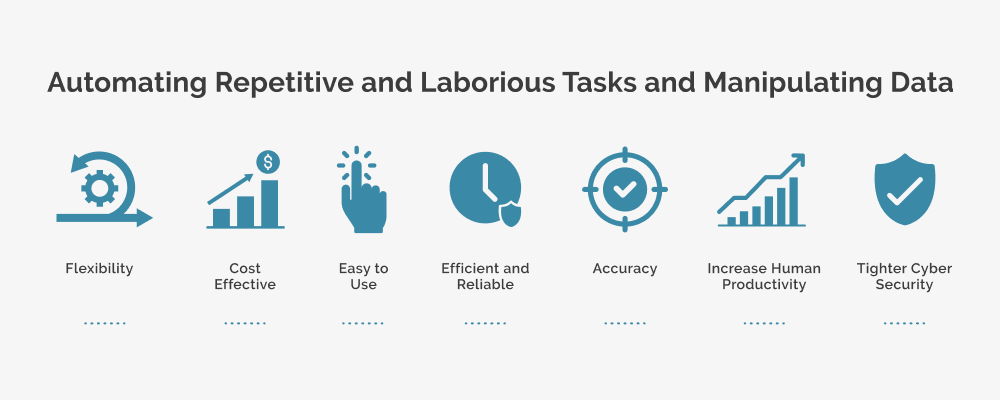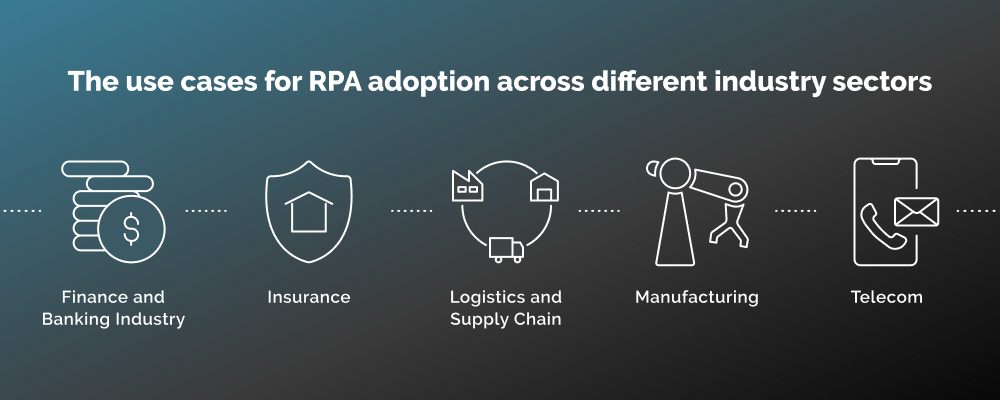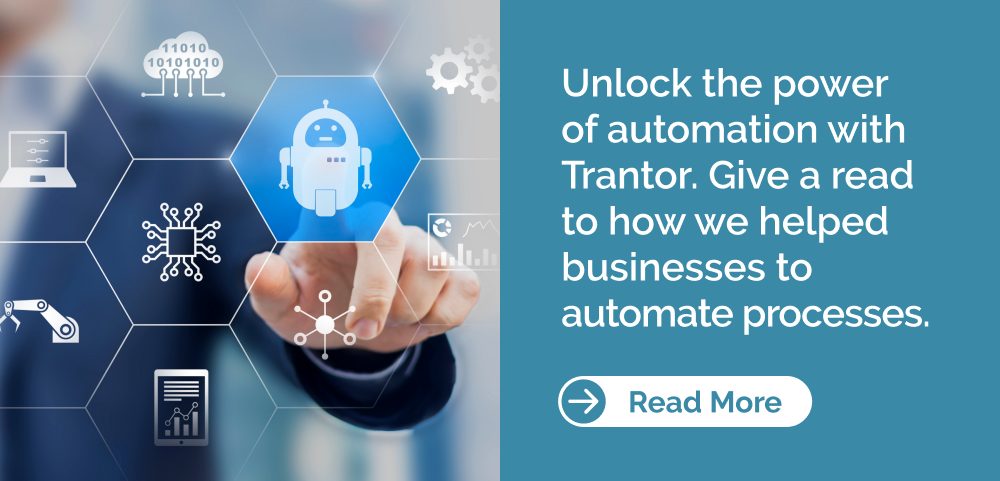Automation, zBlog
Building Intelligent Enterprises: Getting Started with Robotic Process Automation
Khalid Khan , RPA Director Services | Updated: June 28, 2022

As businesses become more complex, and success becomes increasingly dependent on improving processes, it becomes critical to invest in emerging technologies that improve efficiency and enable better decision-making in the back office. RPA brings you one step closer to this goal by significantly reducing turnaround time, interacting with multiple applications in a non-intrusive manner, and improving accuracy and reliability.
Furthermore, RPA (Robotic process automation) can help reduce costs and human errors while also increasing compliance and workforce efficiencies, propelling businesses to a higher level of productivity optimization.
Importance of Robotic process automation (RPA)

- Increase Speed, Quality, and Productivity – RPA bots may be trained to accomplish tiresome, repetitive activities more quickly and precisely than humans.
- Increase the Value of Big Data – Often businesses produce so much data that they are unable to process it all. From this data, there are many chances to learn new things and create more efficiency. By evaluating large databases, both structured and unstructured, RPA is well suited to empower enterprises in interpreting the data they acquire.
- Free up Employees for More Valuable Tasks – Often businesses produce so much data that they are unable to process it all. From this data, there are many chances to learn new things and create more efficiency. By evaluating large databases, RPA allows employees to be freed up to work on more valuable tasks. Employees can take on future jobs, possibly upskilling to implement automation and AI, after leaving behind tedious and repetitive work.
- Make Yourself More Adaptable to Change – Overcoming current and future challenges requires resilience and adaptability. RPA enables organizations to accelerate processes while lowering costs, ensuring that they are prepared to deal with disruption and change.
What are the Advantages of Robotic Process Automation (RPA) ?
RPA isn’t just useful for automating repetitive and laborious tasks and manipulating data; it also has a number of other advantages that an organization can take advantage of.

- Flexibility – RPA is applicable across all industries and organizations, from large corporations to small start-ups. It is easily scalable – and can handle any task with a rule-based element and defined by repeatable action.
- Cost-Effective – It saves your company time and money. You will be able to save time and money by using an RPA approach to perform inefficient operational processes. RPA has the potential to cut operational costs by up to 50%.
- Easy to Use – When used smartly and correctly, RPA can result in significant productivity gains. RPA products frequently include a drag-and-drop GUI, which eliminates the need for employees to receive additional training in coding or other complex fields.
- Efficient and Reliable – Robots never take a day off and can work at any time of day. Work that takes humans hours to complete can be completed in minutes by a robot, such as data entry. RPA data has advantages over human labor in terms of speed and accuracy.
- Accuracy – When compared to human counterparts, RPA can provide higher levels of precision and accuracy. RPA is particularly useful in roles that are prone to human error or are difficult, repetitive, and time-consuming.
- Increase Human Productivity – RPA has the potential to increase worker efficiency. It accomplishes this by allowing employees to focus on tasks that require complex human thought and benefit the organization.
- Tighter Cyber Security – Despite recent advances in cyber security awareness, human error remains a weak link in a company’s cyber defense. Robots are immune to common cyber-attacks such as spear phishing and social engineering.
Automation in Various Industry Verticals

Today, automation encompasses more than just automating manual processes, operations, test cases, or CI/CD. Providing a dynamic, fluid, and agile digital user experience is more important.
Robotic process automation, which effectively minimizes the probability of human mistakes, may be used to automate processes in industries of all sizes. Let’s go through some of the major use cases for RPA adoption across different industry sectors:
- Finance And Banking Industry – Financial institutions were early adopters of automation and will continue to benefit from advances in artificial intelligence. The use of RPA bots in conjunction with AI will automate entire processes such as mortgage loan processing and trade finance, reducing errors, ensuring compliance, and fostering better customer relationships.
- Insurance – RPA is already assisting many insurance providers in accelerating processes ranging from customer onboarding to underwriting. It helps in increasing productivity and also creating a better customer experience.
- Logistics and Supply Chain – RPA companies contribute to analytics and artificial intelligence by gathering information about business patterns and internal workings to reveal potential disruptions and bottlenecks. These insights can be used to improve and optimize specific areas of the supply chain.
- Manufacturing – Manufacturing leaders began to incorporate more RPA to streamline entire processes and improve compliance end-to-end, from processing orders and BOMs (Bills of Materials) to product distribution, including transportation and delivery.
- Telecom – RPA, combined with AI processing, can help automate network optimization so that faults are addressed in real-time with minimal human intervention. RPA can also help telecom companies more smartly manage content offerings.
The same is evident for other sectors, including smart manufacturing, fintech, healthcare, automotive, aerospace, agriculture, and several others.
The Industry 4.0 revolution is adding to this list as a result of the emergence of several creative businesses and use cases that offer end-to-end automation, integration services, and orchestration.

Start transforming your organization for a better future with Trantor.
At the end of the day, the future of automation is all about people. Trantor can assist your team in designing and implementing automation systems that are designed to benefit the human workers who will inevitably determine your success. Discover how the Trantor intelligent automation solutions can help your business today and in the future.



